Authors:
• Vianey Gonzalez B.Sc(Psych) – Psychologist, Certified Deception Professional, Psychology Advisory Panel & Director of the Society of Citizens Against Relationship Scams Inc.
• Tim McGuinness, Ph.D. – Anthropologist, Scientist, Director of the Society of Citizens Against Relationship Scams Inc.
Originally Published: 2019 – Article Updated: 2024
Authors:
• SCARS Editorial Team – Society of Citizens Against Relationship Scams Inc.
• Vianey Gonzalez B.Sc(Psych) – Psychologist, Certified Deception Professional, Psychology Advisory Panel & Director of the Society of Citizens Against Relationship Scams Inc.
• Tim McGuinness, Ph.D. – Anthropologist, Scientist, Director of the Society of Citizens Against Relationship Scams Inc.
Originally Published: 2012 – Article Updated: 2023
Article Abstract
Humor can be a powerful tool in the recovery process for scam victims, offering a unique avenue for healing and resilience. In the realm of psychology, gallows humor, often seen as an expression of resilience in the face of adversity, holds the potential to alleviate suffering and soothe trauma.
This form of humor, born from stressful or traumatic situations, serves as a coping mechanism for individuals dealing with the aftermath of scams. By finding humor in dire circumstances, victims can gain a sense of control and perspective, helping to mitigate the intensity of their traumatic stress reactions.
Despite being underappreciated in therapeutic settings, humor can play a significant role in the healing journey when both practitioners and survivors are open to discussing its impact. By acknowledging the absurdity of their experiences, victims can begin to navigate their recovery journey with resilience and hope, finding moments of levity amidst the darkness.
New Victim Advisory
Humor is generally not suggested for scam victims in their first 6 months after the discovery of the crime, and for some much longer.
Irony (ironic humor) is a nuanced perception/emotion, and for most new victims it has been adversely affected by their trauma and grief.
Gallows humor, characterized by making light of serious or grim situations, serves as a coping mechanism for individuals facing trauma or adversity. By finding humor in dark circumstances, people may temporarily alleviate their distress and regain a sense of control over their experiences. This form of humor can act as a deflection mechanism, allowing individuals to distance themselves emotionally from their trauma and shield themselves from overwhelming emotions. That distancing is NOT recovery, it is avoiding recovery, so it is important to understand that it can help in the moment to remain functional, but in the long run is not usually helpful.
However, while gallows humor can be a coping strategy for those who have undergone significant trauma, it is not typically appropriate or helpful for individuals who are still processing recent traumatic experiences. For those in the early stages of trauma recovery, gallows humor may inadvertently trivialize their pain or inhibit their ability to confront and heal from their wounds.
Therefore, while gallows humor can serve as a valuable coping mechanism for some, it’s essential to recognize its limitations and respect individuals’ varying needs and stages of healing.
We did not always understand this in years past, but as our knowledge of victim & recovery psychology increased we saw this more clearly. When we talk about process improvement, this is but one example of what we mean.
Humor Is More Than Funny For Scam Victims – It Can Also Be Healing!
It represents an alternative means of expressing ourselves in moments of both crises and in talking about extraordinarily difficult situations. It can also be a tool that can help heal trauma!
Gallows humor often is viewed as an expression of resilience and hope that has the power to soothe suffering. When the minority has few tools to combat an oppressive situation, gallows humor can be used as a sort of secret weapon.
Black or gallows humor has long been recognized as having therapeutic value, particularly when used by individuals dealing with traumatic incidents. With this in mind, it is no surprise that this type of humor is commonly used.
A sense of humor that trauma survivors have can be used to assist them in mitigating the intensity of their traumatic stress reactions. A brief review of the literature on the nature of humor and its ability to diffuse stressful situations and reactions can be found here » It is suggested that despite the fact that humor is often underappreciated and ignored in the therapeutic process, it can actually be a powerful healing tool when both the practitioner and the client/survivor are willing to openly discuss it. Humor does not minimize the significance of a terrible event, but it does allow the survivor to see how they can cope and thrive in their environment.
We believe it has use especially in helping to break through denial by helping victims see the absurdity of the situation where a full view of the facts is overwhelming. The same is believed in the case of anger, where humor can be a defusing tool and a means of finding common ground.
According to PsychCentral:
Humor As Weapon, Shield and Psychological Salve
Humor has long been recognized as more than mere fun and games. It presents an alternative means of expressing criticism about injustices, arrogance, pretentions or hypocrisies that can’t socially (or legally) be expressed otherwise.
Court jesters could say things to the royals “in jest” that others would have been beheaded for uttering. When King James I of England had trouble fattening up his horses, court jester Archibald Armstrong reportedly suggested that His Majesty make the horses bishops and they would fatten in no time.
Most people know that schadenfreude, defined as satisfaction or pleasure experienced as a result of the misfortunes of others, is of German origin. But most aren’t aware that “gallows humor” was also coined by the Germans. The original term, ‘galgenhumor’, has been traced to the 1848 revolutions and refers to cynical humor that derives from stressful or traumatic situations. Antonin Obrdlik said that “gallows humor is an index of strength or morale on the part of oppressed peoples,” and it has historically been associated with the persecuted and condemned.
An example of gallows humor can be seen in the Soviet-era joke in which two Russians debate who is greater, Joseph Stalin or Herbert Hoover. “Hoover taught the Americans not to drink,” [referring to the U.S. Depression of the time] says one. “Yes, but Stalin taught the Russians not to eat,” replies the other [referring the the great famine in Russia in the 1930s].
Placing a comical spin on dire circumstances that are outside one’s control was an effective coping mechanism long before the Germans named the phenomenon, and continues to serve the oppressed, victimized and suffering today.
Gallows humor often is viewed as an expression of resilience and hope that has the power to soothe suffering. When the minority has few tools to combat an oppressive majority, gallows humor can be used as a sort of secret, subversive weapon. The danger that ridicule poses to those in power is captured by the Italian phrase “Una risata vi seppellirà”, which translates to “It will be a laugh that buries you.”
The fear of the weapon of humor was alive and well in Nazi Germany, and it was dangerous business. The legal code of the time reflected Joseph Goebbels’ interpretation of the political joke as “a remnant of liberalism” that threatened the Nazi state. Not only was joke-telling made illegal, but those who told jokes were labeled “asocial” – a segment of society frequently sent to concentration camps [very much like today’s “Cancel Culture”]. Hitler’s second-in-command, Hermann Goering, referred to anti-Nazi humor as “an act against the will of the Fuehrer… and against the State and the Nazi Government,” and the crime was punishable by death. Article III, section 2 of the 1941 code (the Reichsgesetzblatt I) stated: “In cases where it is not specifically provided for, the death penalty will be imposed whenever the crime reveals an unusually low mentality or is especially serious for other reasons; in such cases the death penalty may also be imposed against juvenile criminals.” Since Nazi informants could be within earshot at any given moment, it was important to hold one’s tongue and suppress any witty desires. A Nazi prosecutor revealed that he determined the severity of punishment for a joke based on the following theory: “The better the joke, the more dangerous its effect, therefore, the greater punishment.” [today it would get you banned from Twitter, but remains prfoundly serious]
According to “A Laughing Matter: Transforming Trauma Through Therapeutic Humor and Expressive Arts Therapy”
Humor and trauma share two characteristics: they are both perspectival in nature and hold incongruity at their core, however, their impacts are profoundly different for the perceiver. As humor and laughter open one’s psyche and invite positive social exchanges, trauma produces more dissociative, dysregulated and dysfunctional interactions. While fundamental to interpersonal experiences, there has been limited research about the use of humor and laughter as essential tools within the mental health therapeutic alliance. Neurological research and case studies have shown that humor and laughter can have hormonal, physiological and psychological benefits. Due to the perspectival nature of humor and trauma, attunement within the therapeutic relationship is vital for personal transformation. Here, the opportunity is offered to synthesize verbal and non-verbal expression through decentering and play methods that incite humor and laughter and aid the transformation of debilitating associations with past traumatic experiences into perspectives of self-awareness, self-empowerment and an acknowledgment of resilience.
The trauma-informed treatments, like the ARC Framework, provide a safe and solid foundation where expressive arts therapy and therapeutic humor can be utilized. Thus, the findings of this capstone thesis recommend further investigation into the intentional implementation of therapeutic humor within the expressive arts therapy approach especially when working with adult survivors of developmental trauma, to cultivate attunement between the therapist and client.
Essential Scam Humor
We always must remain conscious of the pain that victims have experienced, and not all survivors will regain sufficient stability to where humor can help them through the final phases of their recoveries. However, there is inherent humor in the absurdity of these situations when presented in a non-blaming manner, where the victim can see their situation from a different perspective.
SCARS believes that humor can help heal victims’ trauma and employs it sparingly to help both victims and nonvictims observe the insanity of the world we live in today. Humor can be universal and can help everyone see these new relationships, traps, and traumas. But we also have to remember that victims go through processes where any alternative views are beyond their ability to see and thus can be threatening.
What is Funny About Scams?
In the real sense nothing. Except the situation has elements of humor throughout. If we can take a step back from the edge we can see that.
For that reason, we recommend that new victims avoid all scam-related humor, but at the same time do not let themselves be triggered by it. It is not intended to offend you, just to help expose how truly bizarre the world really is.
Here is a Collection of Scam Humor
TRIGGER WARNING: Scam Humor is not for everyone!
Leave the page now if you are offended by it.
If you like it, great – if you hate it, that is ok too!
If you are triggered by it, then that tells you something about your state of recovery also. Just don’t look and ignore it! We are not here to make fun of victims or to blame them, these just serve to help victims and nonvictims alike to see the absurdity and irony in this whole experience.
Important Information for New Scam Victims
- See more at www.ScamVictimsSupport.org – a SCARS Website for New Scam Victims
- New Scam Victims – the Importance of Starting Off Right
- SCARS 3 Step Scam Victims Support & Recovery Program
- Importance Of Learning In Scam Victims’ Recovery From Scams
- For New Scam Victims – Additional & Essential Information
More About Humor & Coping Mechanisms:
- Trauma Grief & Humor As A Coping Mechanism (romancescamsnow.com)
- Scam Victim Trauma: Positive and Negative Coping Mechanisms (scamsnow.com)
- SCARS 5 Coping Techniques For Traumatized Scam Victims – 2023 (scamsnow.com)
- Scam Victims Editing Their Stories To Promote Recovery From Scams 2024 (scamsnow.com)
- Importance of Scam Victims’ Learning in Recovery from Scams 2024 (scamsnow.com)
- Scam Victims Suppressing Trauma Or Avoiding Recovery And Healing 2024 (scamsnow.com)
- Coping Strategies for Scam Victim Trauma Survivors (romancescamsnow.com)
- Hate As A Coping Mechanism (romancescamsnow.com)
- Scam Victims Suppressing Trauma Or Avoiding Recovery And Healing 2024 (scamsnow.com)
- Scam Victims Use Work To Avoid Healing (scamsnow.com)
SCARS Resources:
- Getting Started Right: ScamVictimsSupport.org
- For New Victims of Relationship Scams newvictim.AgainstScams.org
- Subscribe to SCARS Newsletter newsletter.againstscams.org
- Sign up for SCARS professional support & recovery groups, visit support.AgainstScams.org
- Join our Scam Survivors United Chat & Discussion Group facebook.com/groups/scam.survivors.united
- Find competent trauma counselors or therapists, visit counseling.AgainstScams.org
- Become a SCARS Member and get free counseling benefits, visit membership.AgainstScams.org
- Report each and every crime, learn how to at reporting.AgainstScams.org
- Learn more about Scams & Scammers at RomanceScamsNOW.com and ScamsNOW.com
- Scammer photos ScammerPhotos.com
- SCARS Videos youtube.AgainstScams.org
- Self-Help Books for Scam Victims are at shop.AgainstScams.org
- Donate to SCARS and help us help others at donate.AgainstScams.org
- Worldwide Crisis Hotlines: https://blog.opencounseling.com/suicide-hotlines/
Other Cyber Resources
- Block Scam Domains: Quad9.net
- Global Cyber Alliance ACT Cybersecurity Tool Website: Actionable Cybersecurity Tools (ACT) (globalcyberalliance.org) https://act.globalcyberalliance.org/index.php/Actionable_Cybersecurity_Tools_(ACT)_-_Simplified_Cybersecurity_Protection
-/ 30 /-
What do you think about this?
Please share your thoughts in a comment below!
To Learn More Also Look At Our Article Catalogs
Scam & Crime Types
More SCARS
- ScamsNOW Magazine – ScamsNOW.com
- ContraEstafas.org
- ScammerPhotos.com
- AnyScam.com – reporting
- AgainstScams.org – SCARS Corporate Website
- SCARS YouTube Video Channel
Do You Need Support?
Get It Now!
SCARS provides the leading Support & Recovery program for relationship scam victims – completely FREE!
Our managed peer support groups allow victims to talk to other survivors and recover in the most experienced environment possible, for as long as they need. Recovery takes as long as it takes – we put no limits on our support!
SCARS is the most trusted support & education provider in the world. Our team is certified in trauma-informed care, grief counseling, and so much more!
To apply to join our groups visit support.AgainstScams.org
We also offer separate support groups for family & friends too.
Become a
SCARS STAR™ Member
SCARS offers memberships in our STAR program, which includes many benefits for a very low annual membership fee!
SCARS STAR Membership benefits include:
- FREE Counseling or Therapy Benefit from our partner BetterHelp.com
- Exclusive members-only content & publications
- Discounts on SCARS Self-Help Books Save
- And more!


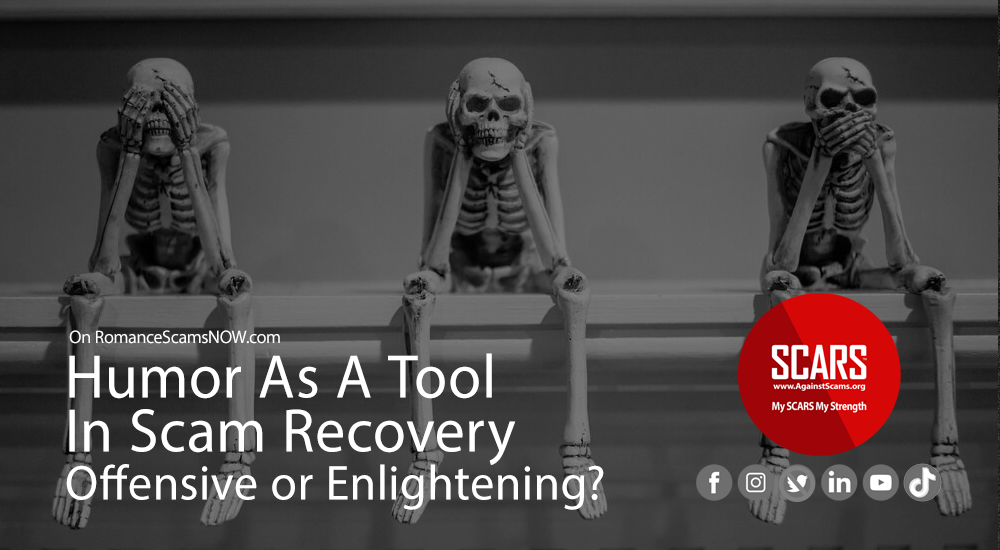
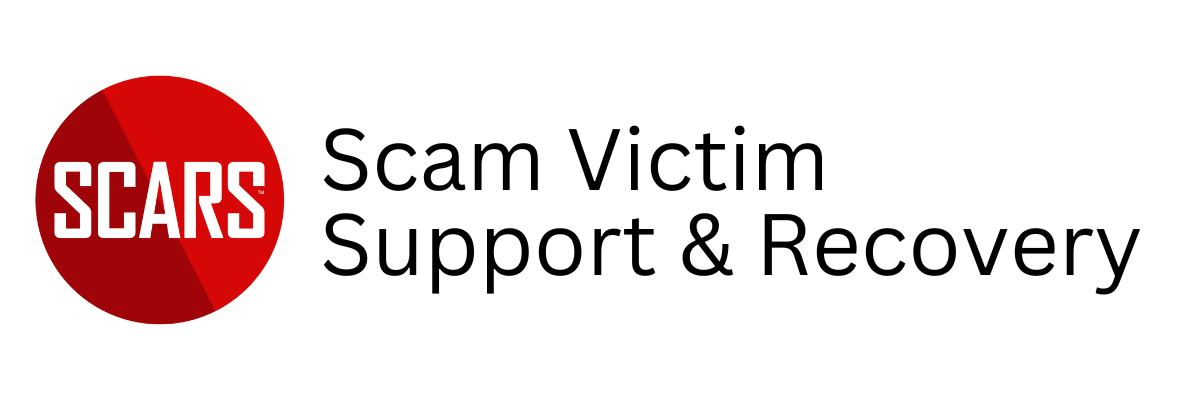

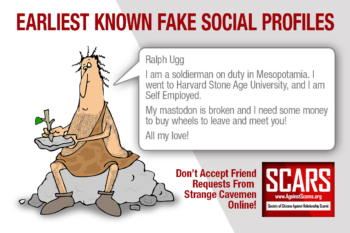















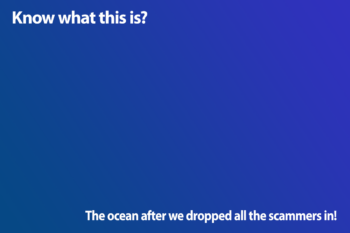


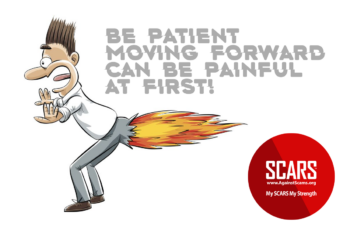

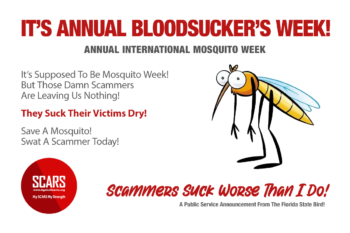

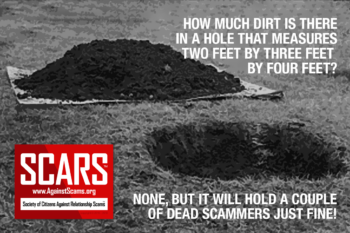



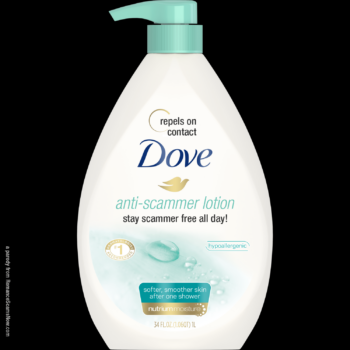












![An Example of How Scammers Use Emergency Scams - 2014 [UPDATED 2024] - on SCARS RomanceScamsNOW.com](https://romancescamsnow.com/wp-content/uploads/2014/06/emergency-scams.png)

Please Leave A Comment - Tell Us What You Think About This!